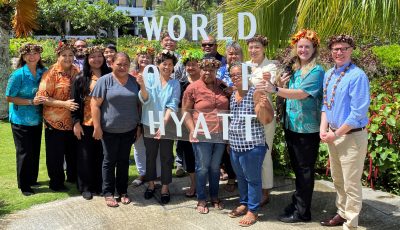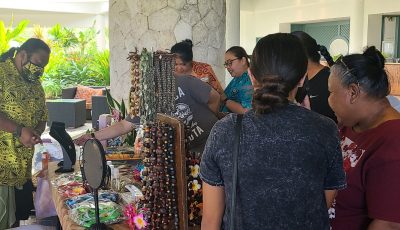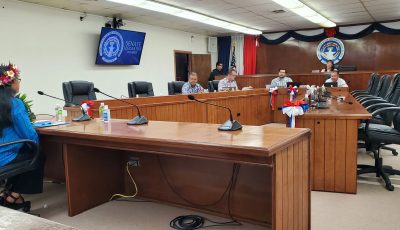DCCA: Legislation needed to strengthen respite care services
Department of Community and Cultural Affairs Secretary Robert Hunter recently met with officials from the Northern Marianas College School of Education and Nursing Program to discuss a partnership for respite care services.
Respite care is a service provided to children and adults with chronic or terminal illnesses, disabilities or those at risk of abuse and neglect. Respite care serves to provide temporary relief to unpaid primary caregivers for the purpose of stability, time-off, and preservation of care.
“We see an opportunity to use the respite care program to benefit nursing school students and improve collaboration for training of respite care providers. There is a recently entered into memorandum of understanding with the Developmental Disabilities Council, placing the provision of respite care services under DCCA, as well as legislation to place the respite care program permanently under the DCCA. To that end, we have been working on putting together all of the pieces. This has included coordinating training for staff, developing a program model, organizing training for respite care providers, setting up a respite care center, and working with partners who will promote and implement these services,” Hunter said.
Office of Aging director Walter Manglona earlier noted that the Caregiver/Respite Care Program began through funding from the National Family Caregiver Service Program, which assisted family members caring for the elderly by providing short-term relief to all eligible caregivers.
“Caregivers are an essential part of our community, especially as it pertains to caring for our man’amko. Many caregivers, especially those within the family have the best interests of their loved ones at heart. However, it is with respite care that we can ensure caregivers pay attention to their own physical and mental wellness, and get proper rest to continue to provide care,” Manglona said.
Hunter added that with the proposal of House Bill 20-140, respite care services will be centralized and strengthened for the benefit of the entire Commonwealth.
“A respite care partnership will ensure that family members and other caregivers supporting older individuals are able to provide adequate services to individuals in need. Previously, the Office on Aging provided respite care to alleviate stress and prevent burn out, to each registered caregiver, but this legislation further identifies local training resources and recruiting of respite care providers. We can further ensure quality services and development for not just the elderly, but children and individuals with developmental disabilities, and those who are homebound. With this legislation, we can look toward lengthening the lifespan of the respite care program and leverage existent resources under the department,” Hunter said.
CNMI Respite Program coordinator Jack Sablan noted that the provision of respite care services has been proven to reduce abuse and neglect of individuals in permanent care and increase the mental and physical health and well-being of caregivers.
“With an understanding of some of the unique challenges in our community, we are not only developing a homebound care program, but we are already nearing completions on the renovation of a respite care facility, where clients can be dropped for scheduled respite services,. We will also be developing contingents of respite care providers on Tinian and Rota to ensure all of our communities are served,” Sablan said.
Gov. Ralph DLG Torres emphasized that integrating and establishing respite care services within the department helps develop community resources and bridges the gap between theaging population, childcare, and youth services.
“Caretaking is ingrained into our culture and formally establishing the authority for respite care services fills an ongoing need in healthcare. We see that childcare services under the Childcare Development Fund have improved through their pilot training and development outreach. I look forward to seeing that our community members who need the additional assistance have a central agency to go to. At the same time, we will create opportunities for our local college to explore caregiving and improve our awareness towards the needs of our elderly and our diverse community. This foresight is truly the gift of reciprocity which ultimately benefits families, service providers, and our community in the long-run,” Torres said.



























